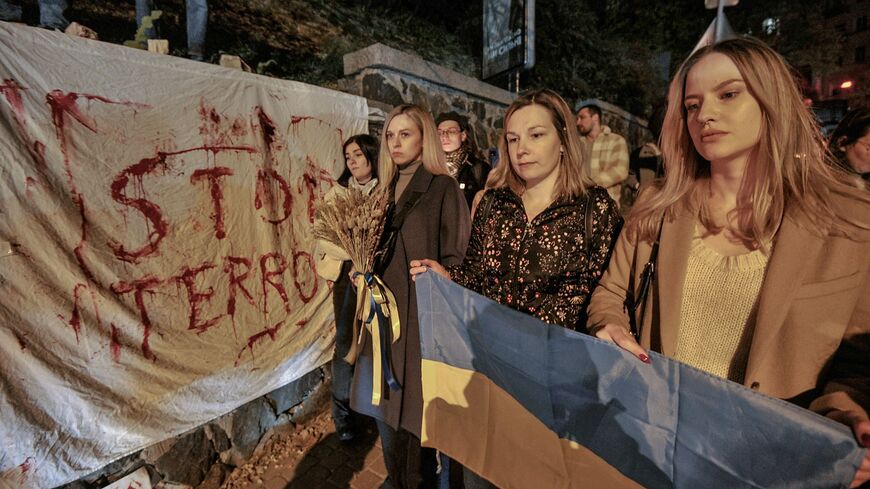Our take: Iran's deeper involvement in Russia’s faltering war on Ukraine marks a new chapter in relations between the two international pariahs.
Ukraine is moving to formally sever ties with Iran after a barrage of Iranian-produced Shahed-136 drones struck civilian targets in Kyiv and other Ukrainian cities on Monday, killing four people.
Yurii Ihnat, a spokesman for Ukraine’s air force, said the country's air defense systems successfully shot down 37 out of 43 drones launched by Russia, whose increased use of cheap Iranian-manufactured drones comes as its own arsenal of advanced weaponry has dwindled. Along with more drones, The Washington Post reported Sunday that Iran is preparing to ship ballistic missiles to Russia.
“Using inexpensive drones like the Shahed at $20,000 apiece is an attempt to deal with a shortage of Russian advanced missiles and attrite Ukrainian air defense systems,” said Mick Mulroy, a former Pentagon official and retired CIA officer.
Despite ample evidence, Iran denies supplying Russia with weapons to be used in Ukraine. Iranian Foreign Minister Hossein Amir-Abdollahian told Al-Monitor last month that Iran is “not supporting either side in the Ukrainian war.”
Alex Vatanka, director of the Iran Program at the Middle East Institute, speculates that Tehran’s denial is partially due to the optics around its engagement with Moscow. Recent polling indicates a majority of Iranians view Russia’s invasion of Ukraine as illegitimate.
“There's a lot of public opinion in Iran that is against this because they don't see the sense in Iran being so close to Russia,” he said.
The deepening military cooperation between America’s geopolitical foes “should be seen as a profound threat,” Vedant Patel, a deputy spokesman for the State Department, told reporters on Monday.
Patel warned the United States would respond with “practical, aggressive steps,” including through sanctions and export controls. The Treasury Department in September sanctioned four Iranian companies for their alleged involvement in the drones’ production and transfer to Russia.
The United States, France and the United Kingdom say Iran’s shipment of drones to Russia constitutes a breach of UN Security Council Resolution 2231, which endorsed the 2015 nuclear agreement known as the Joint Comprehensive Plan of Action (JCPOA). The 15-member Security Council was expected to discuss the issue in a closed-door meeting Wednesday.
“By entering this new theater of Ukraine, Iran has kind of signaled to both the West and Russia that it's a power to be reckoned with,” said Ellie Geranmayeh, a senior policy fellow at the European Council on Foreign Relations.
“It signals to the United States that [Iran] has freedom of options if the US pulls the plug from the JCPOA talks and shuts the door to sanctions relief,” she said.
Geranmayeh said Iran’s testing of advanced weaponry in Ukraine could also be intended to send a message to its regional foes, including Israel, Saudi Arabia and the United Arab Emirates, that “if you're considering taking these Abraham Accords to a new security partnership aimed at countering and weakening Iran, we've got some news for you. We are capable of causing great damage.”
In a further sign of growing Russia-Iran cooperation, The New York Times reported Tuesday that Iran has sent drone trainers from the Islamic Revolutionary Guards Corps to a Russian military base in occupied Crimea. Officials who spoke to the Times said it wasn’t clear if the Iranian trainers were themselves remotely flying any of the aircraft.
They are nonetheless combatants, said Mulroy. “It's one thing to sell a country weapons systems that they then use in a conflict or war. It's another thing to then insert your own troops in there to make sure they're used to the most lethal effect.”
From our regional contributors:
• Israel’s Defense Minister Benny Gantz made clear Wednesday that Israel will not supply weapons to Ukraine, despite increasingly harsh criticism of Russia’s conduct by Israeli Prime Minister Yair Lapid. The strained tensions between Israel and Russia have some Israeli experts concerned that Russian hackers could interfere in Israel’s upcoming election, Ben Caspit reports.
• Also of concern for Israel is the Lion’s Den, a Palestinian resistance group operating in the West Bank city of Nablus. As Ahmad Melhem reports, the Israeli security services have accused Hamas of supplying the group with money and arms to carry out its daily attacks.
• Syria has fallen out of the news cycle, but here’s a story you shouldn’t miss. In a dramatic shift of control, Syrian militant group Hayat Tahrir al-Sham aligned with factions from the Turkey-backed Syrian National Army to storm into the Kurdish-majority city of Afrin. Fehin Tastekin writes that HTS’ advance “raises questions about Ankara’s calculus in its quest to mend fences with Damascus.”
• Al-Monitor Pro subscribers should check out Gerald Kepes’ latest memo on how the success of the newly reached maritime agreement between Lebanon and Israel will require working groups from both countries to hash out the deal’s technical and commercial complexities.
• Plus, Karen Young explains why meeting both the MENA region’s electricity demand and ambitious climate goals may require a nuclear energy system of renewable and non-hydrocarbon sources. Read her memo here.









